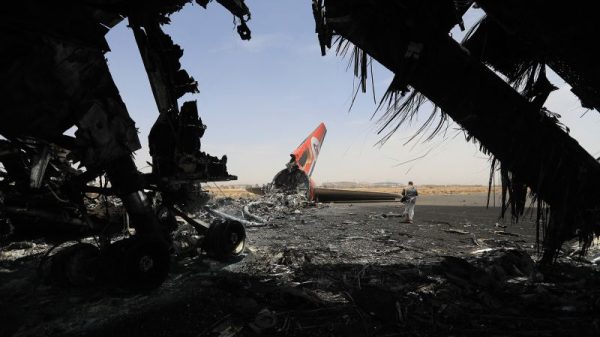Houses stormed on Shabbat, children murdered in their beds, breakfast still on the table. The world changed, yet again, on October 7, 2023, when Hamas terrorists invaded Israel to murder as many civilians as possible.
Not only did Hamas commit unspeakable atrocities against Israelis, but against other foreigners who had the misfortune of being in the worst place at the worst time; Americans were murdered, and more are being held hostage in Gaza, a fate, perhaps worse than death.
That the Islamic Republic of Iran, the world’s biggest state sponsor of terror, has a relationship with Hamas, a State Department designated Foreign Terror Organization since 1997, cannot be disputed. Hamas and Iran want to eliminate the Jewish state and its people. For Hamas and Iran, there is no solution which involves two states — there is only one, a final solution. Sound familiar?
If, or more likely when, it is determined that Iran was involved in the attack, what recourse have the grief-stricken loved ones in the United States, other than cursing Iran, Hamas, and all its benefactors and sympathizers (including college students, administrators, and professors) around the world? The old-fashioned, American kind: filing suit.
A constellation of U.S. laws allows the surviving family members of terror victims to sue nations that took part in the acts of terror either directly, or by providing financial backing and other assistance. Arguably, the most high-profile example is the 9/11 victims’ lawsuit against Saudi Arabia, still winding its way through the courts.
An alphabet soup of Acts — The Foreign Sovereign Immunities Act (FSIA), The Antiterrorism Act (ATA) and Justice Against Sponsors of Terrorism Act (JASTA) — have whittled away foreign sovereign immunity protections in favor of victims of terror attacks and their anguished survivors. It would be no different in a new lawsuit against Iran — should there be enough evidence linking it to the Hamas massacre.
Sovereign immunity is a legal doctrine which generally prevents citizens from suing the government without its consent, preventing governments from being subjected to constant lawsuits over their actions. Like everything else in the law, there are exceptions. Laws have been passed that allow citizens to sue the government, and in this case, foreign governments.
The Foreign Sovereign Immunities Act confirms that generally, foreign nations enjoy sovereign immunity, but there are specific exceptions, including terrorism. One hundred and seventeen families of the victims of the Lockerbie bombing of Pan Am Flight 103 successfully sued Libya under FSIA.
The Antiterrorism Act also allows aggrieved terror victims or their survivors to sue in U.S. district court and recover three times the damages. The ATA was expanded in 2016 — over then-President Barack Obama’s veto — by the Justice Against Sponsors of Terrorism Act.
JASTA’s goal was to make it easier for 9/11 victims and their families to sue Saudi Arabia for its role in that world-changing act of terror, so that a nation who simply ‘aids and abets’ or conspires with terrorists can face liability. JASTA is not limited to 9/11 claims against Saudi Arabia; it could apply against Iran in this current context.
While these cases are among the most legally complex, they can also force the executive branch to walk a diplomatic tightrope. JASTA was one of Obama’s few vetoes, and the only one to be overwhelmingly overridden by Congress.
Why oppose a law aimed at making it easier to penalize nations that help terrorists terrorize? Fear of diplomatic and economic consequences (i.e., Saudi Arabia not investing in the U.S. for fear of its assets being seized in a terrorism lawsuit).
Because of this concern, JASTA allows for a federal court to stay proceedings if the U.S. is engaged in ‘good faith’ discussions with a foreign state concerning resolution of claims. While this pause may not be granted for more than six months at a time, the government can ask for additional six-month periods, which could effectively delay justice indefinitely.
On June 21, 2023, bipartisan legislation was introduced, Ensuring Justice for Victims of Terrorism Act, a bill billed to close loopholes in JASTA by making what Texas Republican Senator John Cornyn calls ‘minor technical edits’ to ensure that sponsors of terrorism are held accountable. Currently, the bill is still in committee, but there could be a push to fast track this relief, given the new world order that has emerged since October 7, 2023.
While there remain concerns about the chilling effect JASTA could have on foreign investment and diplomacy, should we really care about whether we continue to do business with countries whose values and interests are so opposed to ours? Should the potential of more foreign investment from questionable actors be paramount to providing financial redress to the families of terror victims?
Sovereign immunity is a legal doctrine which generally prevents citizens from suing the government without its consent, preventing governments from being subjected to constant lawsuits over their actions. Like everything else in the law, there are exceptions. Laws have been passed that allow citizens to sue the government, and in this case, foreign governments.
As for a chilling effect on diplomacy, we cannot do enough to turn a hostile country’s hate to love, or even to like. There would be no end to the sacrifices and concessions the U.S. would have to make for Iran to be an ally instead of an adversary. Diplomacy — like easing sanctions, allowing economic growth, releasing prisoners and $6 billion in aid to Iran has gotten us nowhere but to the brink of a second front opening in this new war with another Iran-backed Foreign Terrorist Organization, Hezbollah.
Justice for the bereft family members of terror victims is never swift or guaranteed. If Iran is eventually sued by surviving families of this attack, there will be motions, disputes over the densely written statutes, dispositive legal questions with which appellate courts will grapple, and the list goes on. Multi-figure judgments will not bring back what these families lost, but it at least gives them the chance to exact the only legal revenge they have.
An undeniable pall has been cast over every day, especially on Shabbat, in America and abroad, with no true remedy for the families but time. But these nations who sponsor terror ought to pay as big a price as possible.







































